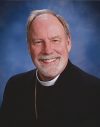The ELCA is a church I am proud to be a member of and proud to serve and lead in as a pastor and bishop. We aren’t perfect—but what sense does that even make to a Lutheran, and to all Christians who understand we are both saint and sinner, fully intertwined, until that final day when God will complete God’s work and bring in the new heavens and new earth?
I don’t expect the ELCA to be perfect in order to belong to it, love it, and respectfully and constructively point out flaws and growing edges—all while serving it joyfully.
One thing I am glad for—even when it brings consternation to some—is that we don’t duck and hide when tangible, everyday problems in our world directly intersect with our faith and Christian values.
Whether it’s immigration, the environment, Middle East peace, marginalized people, justice issues, human sexuality, poverty, sexism, etc., I’m glad for those who are at least genuinely trying to address both the evil around us and the complex problems our society and church deal with. (See our social statements for more.)
But the best way to address these issues is through that powerful word “love.” Here are some tips I’ve learned along the way.
-
You and I don’t know everything.
“For we know only in part, and we prophesy only in part; but when the complete comes, the partial will come to an end. When I was a child, I spoke like a child, I thought like a child, I reasoned like a child; when I became an adult, I put an end to childish ways. For now we see in a mirror, dimly, but then we will see face to face. Now I know only in part; then I will know fully, even as I have been fully known” (1 Corinthians 13:9-12).
-
Be curious, not furious.
Having been to a few church basement meetings over the past 12 years as bishop during some controversial seasons, I can tell you I have seen both the curious Lutheran and the furious Lutheran. Both exist inside me as well. But being curious is better any day of the week. Curiosity seeks to learn, not to remain ignorant.
Words can give life, and words can kill. Words chosen carefully will draw out more intelligent conversation.
-
The people with whom you argue are made in the image of God—just as you are.
Be careful with your words. I’ve learned that—and have to keep learning it. Words can give life, and words can kill. Words chosen carefully will draw out more intelligent conversation. As one of my colleagues says regularly, “Our Lord never said, ‘Be stupid.’”
-
Hurt and anger are twins.
Keep this in mind when someone (or you) begins to speak loudly. I learned this while teaching the course “Death, Dying and Grief.” When someone lashes out in anger, beneath that is probably hurt. It may be a recent hurt; it may be an old one we have never dealt with. Don’t let your anger jag keep you guilty forever or empower you to get louder and more self-satisfied. Take it to God in prayer; ask God what is going on inside you. Take your own inventory (flaws and gifts) often, so you can get to know yourself better—you will be a better communicator in the end. When someone else is yelling, ask yourself, “What has hurt this person? Can I demonstrate empathy and compassion?”
-
Be patient.
Patience is already being formed in you, and it helps to know and trust this. The job of the Spirit is to form Christ in you. And that is happening all the time, thank God! So use this patience in your dialogue with others. “The fruit of the Spirit is love, joy, peace, patience, kindness, generosity, faithfulness, gentleness, and self-control” (Galatians 5:22-23).
-
Truth is many-faceted.
Recognize that when another person has a different viewpoint, there may well be an element of truth in it. Find it. State it. See how the anxiety goes down and the thinking goes up. And when you are convinced of your truth, say it in love, not in anger or one-upmanship.
-
Love trumps everything else.
I don’t mean love as a mushy, innocuous, romantic sentiment. I mean our Lord’s love. Remember, you are claimed as a child of God, under God’s reign and values. It was Christ, the second person of the Trinity, whom you were joined to in baptism by the Spirit, and you received his grace, courage and love. You were grafted onto the church in baptism as well, with all its goodness and all its flaws. And the greatest good in the church is the power of love. A huge part of the strength of real love is the ability to also say, “I’m sorry, I made a mistake. I ask your forgiveness. Can we continue to talk and learn together?”




